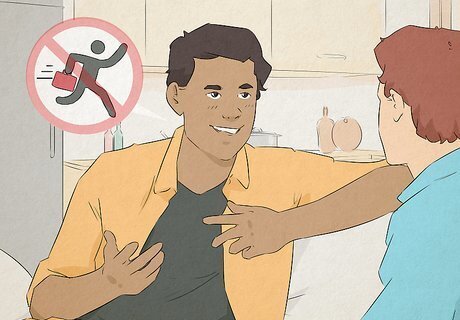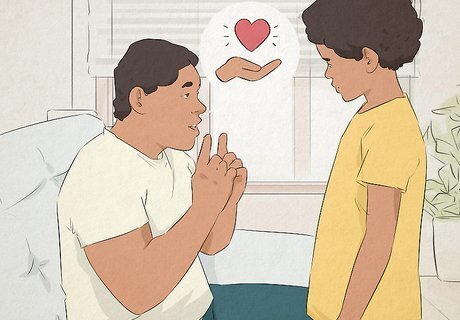
views
Sharing Your Accomplishments More Humbly

Acknowledge the challenges you faced to seem humble. It’s totally fine to be proud of yourself. The key is just to add something else to the conversation when you are talking about your achievements. Make it clear that you are thankful for your ability to succeed. The person you’re talking to will likely appreciate your gratitude. Instead of saying, “I crushed my goals last quarter. Can you believe how well I did?” say, “I was really fortunate that I hit my numbers. A lot had to go right in order for that to happen! It was tough during this economy, so I had to get creative.” Congratulate yourself and give yourself credit if you have been working on improving aspects of yourself.

Emphasize your hard work, not your achievements. If you only talk about the results, that can seem like bragging. If you tell others a little more about the process that you went through, you’ll sound more humble and relatable. You don’t have to go into great detail, just add a few key points. You could say, “I earned a great score on my LSATs. I think it really helped that I set up a study schedule and stuck to it for several months. It was tough, but it paid off.”

Give credit to others that helped you out. If you only talk about yourself, that typically sounds a lot like bragging. Even if you feel like you deserve most of the credit, it’s a good idea to acknowledge that you got a little help along the way. This is especially important if your success is directly related to someone else. Try, “I feel like I really pitched a great game the other day. But that wouldn’t have gotten us the win if my teammates hadn’t gotten all of those hits!” This sounds a lot nicer than, “I pitched a great game and that’s why we won!”

Say positive things about others instead of criticizing them. You might feel like in order to prove how well you did, that you also need to show that someone else didn’t do great. That’s not true. Let your accomplishments speak for themselves. If you mention someone else, keep it positive. Don’t say, “Have you seen my new condo? It is so much nicer than Kelly’s!” Instead, try, “I’m really happy with my new place. I’d love for you to see it! I hear Kelly's is nice, too!”

Think before you post on social media to avoid hurt feelings. It can be really easy for people to take your posts the wrong way. They can’t hear your tone of voice or read your facial expression, so it’s important to make sure your words really convey what you mean. Think carefully about what you post and read it before you share. A thoughtful, humble post might be something like, “I’m excited to share that I’ve accepted a position at State University. It’s an honor to be joining such a great institution.” It will come off better than, “Yes! I nailed my job interview and beat out everyone else to land a job at State University.”
Avoiding Sensitive Subjects

Keep your audience in mind to avoid offending anyone. This goes along with the old advice to think before you speak. In addition to that, think about who you are speaking to. If the other person might be hurt or offended by your news, consider sharing it with someone else instead. For example, maybe don’t talk about a recent promotion to your friend who just got laid off. Instead, share that news with a friend who is enjoying similar success at work.

Don’t boast about being tired since it is not an accomplishment. Life can feel exhausting to a lot of people, so there’s no need to brag about being tired. It’s not a sign of success, even though some people treat it as such. It can rub people the wrong way, so avoid boasting about how tired you are. It’s okay to vent to a friend or family member if you are feeling worn down. Just don’t act like you’ve accomplished something by being tired.

Try not to talk about how busy you are as a way to prove your worth. Most people are busy, so this is another point that you should avoid bragging about. If you feel the need to talk about being busy, make sure that it is actually related to an accomplishment. Don’t talk about being busy as if that is the accomplishment. Instead, talk about the other great things you're doing. Try saying, “I’ve been extra busy lately because I’ve been trying to help my mom move into her new place. I’m glad I’ve been able to squeeze that into my schedule.” That will go over better than, “I’m just crazy busy lately. You wouldn’t even believe how busy I am! I’m doing so much.”

Express pride in your kids without boasting if you're a parent. Of course, you think your kids are great! That’s totally normal, and it’s fine to express that. Just take care to talk about specific accomplishments. Don’t exaggerate. That will make others feel like you’re bragging, even if you’re not trying to. Say, “Sammy got an A in calculus. I’m so proud that his hard work paid off.” This sounds more humble than, “Sammy got the best grade in the class. He's so brilliant!”

Limit talking about money to sound humble. A lot of people think talking about money is impolite, and there’s a good reason for that. If you talk about how much you make or spend, it can sound really arrogant. Also, it’s no one’s business. If you must talk about money, don’t use specifics. Instead of saying, “My bonus topped six figures!” say, “I’m grateful that my hard work paid off and I earned a healthy bonus this year.”
Helping Others Stop Bragging

Model good behavior by not bragging. Many people, including kids, tend to mimic what they see, so it’s important to set a good example. Make it a point to watch what you say around kids or adults who have a habit of bragging. If you don’t brag in front of them, they will be less likely to start bragging. Fun fact: adults also model their behavior on others sometimes. Set a good example for anyone who is around you by staying humble. If your kids brag anyway, that doesn’t necessarily mean it’s your fault. Just take a minute to explain why they shouldn’t brag and help them find an alternative way to express themselves.

Try not to make comparisons to other people to prevent bragging. If you make it seem like comparison is necessary, the people you interact with that might start doing it, too. In particular, kids might brag if they think they have a reason too. Don’t measure their accomplishments with what other kids have done. Instead, just focus on one individual at a time. For example, don’t say, “Wow, you were better than everyone else at the soccer game today!” Instead, try, “You did a great job passing the ball today. I love seeing that teamwork from you!”

Spend quality time with people to make them feel good. Bragging is sometimes the result of feeling insecure. That’s true for both kids and adults! If your kids or your friends are bragging, try to give them a little extra attention. Adding some extra quality time to their day might be just what they need. If you've noticed a friend being extra boastful lately, ask them out for a coffee date. They might just need some quality time with you. If you have multiple kids, try to give each of them some extra one-on-one time with you. That could be as simple as reading an extra book to each of them at bedtime.

Teach them kindness to help them be humble. It isn’t terribly kind to brag. If you instill a sense of kindness in kids, it might help them realize that bragging can be hurtful. In addition to being a good role model, you can do things with kids like to have them volunteer with you to develop kind habits. If your kids are too young to volunteer, you can help them learn kindness by teaching them to share their toys. You can model this type of behavior for everyone in your life. Recruit some friends to volunteer with you, too.




















Comments
0 comment